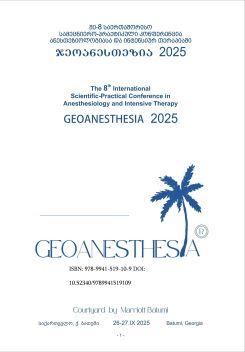PECIFICITIES OF DIAGNOSING ACUTE POISONING AND EARLY MANAGEMENT ERRORS
DOI:
https://doi.org/10.52340/9789941519109.16Keywords:
acute poisoning, toxicology, emergency medicine, diagnostic challenges, salicylate toxicity, anticholinergic syndromeAbstract
Background: Acute poisoning represents a significant challenge in emergency medicine, particularly in healthcare systems characterized by limited diagnostic resources [1]. The absence of specialized toxicological laboratory facilities creates substantial barriers to accurate diagnosis and appropriate management of poisoned patients. Most importantly, staff training with appropriate education is crucial - there is an acute deficit of clinical toxicologists [2].
Objective: To analyze diagnostic challenges and early management errors in acute poisoning cases, with emphasis on the impact of limited laboratory resources and clinical misinterpretation of symptoms.
Methods: This study examines two representative cases highlighting common diagnostic pitfalls in emergency departments lacking specialized toxicological testing capabilities.
Case Studies: Case 1 - Salicylate Overdose Misdiagnosis: Following an overdose of 100 aspirin tablets, a patient was brought to the emergency department with severe psychomotor agitation and hallucinations. History taking could not be performed, and consequently the patient was admitted to the psychiatric department. The neuropsychiatric manifestations of salicylate toxicity were misinterpreted as primary psychiatric symptoms, leading to delayed diagnosis of poisoning and inappropriate initial management [3].
Case 2 - Anticholinergic Syndrome Mismanagement: A patient presented to the clinic with visual hallucinations, disorientation, sinus tachycardia, hypertension, dry cough, and hyperthermia. Treatment included antipsychotic medications, antiarrhythmic agents, antihypertensive drugs, and antipyretic agents. A lumbar puncture was performed for diagnostic purposes. Patients with anticholinergic syndrome underwent multiple unnecessary diagnostic procedures due to failure to recognize the characteristic clinical pattern [1]. Inadequate clinical assessment resulted in delayed identification of the toxidrome, and consequently antidote was not administered.
Key Findings: Absence of specialized toxicological laboratories in Georgia significantly impairs diagnostic accuracy. Clinical recognition of toxidromes is often inadequate, leading to misdiagnosis [4]. Psychomotor symptoms are frequently misattributed to psychiatric conditions. Unnecessary investigations delay appropriate treatment and antidote administration. Early management errors stem from insufficient toxicological knowledge and limited diagnostic resources.
Conclusions: The lack of specialized toxicological diagnostic facilities creates a cascade of management errors in acute poisoning cases [5]. Improved clinical training in toxidrome recognition and development of toxicological laboratory capabilities are essential for optimal patient outcomes. Appropriate education of medical personnel in this area is significant, as they must primarily rely on clinical assessment skills when laboratory confirmation is unavailable. Unnecessary financial expenditure represents a considerable burden for healthcare services.
Clinical Implications: It is essential to develop standardized toxicological assessment protocols and ensure staff training in clinical toxicology to compensate for diagnostic limitations [4]. Recognition of characteristic symptom patterns remains the cornerstone of diagnosis in resource-limited settings.
References
Goldfrank LR, Flomenbaum NE, Lewin NA, et al. Goldfrank's Toxicologic Emergencies, 11th ed. New York: McGraw-Hill, 2019.
Nelson LS, Howland MA, Lewin NA, et al. Goldfrank's Toxicologic Emergencies, 10th ed. New York: McGraw-Hill, 2015.
Shannon MW, Borron SW, Burns MJ. Haddad and Winchester's Clinical Management of Poisoning and Drug Overdose, 4th ed. Philadelphia: Saunders, 2007.
European Association of Poisons Centres and Clinical Toxicologists. Guidelines for the management of poisoned patients. Clin Toxicol. 2019;57(4):203-210.
World Health Organization. Guidelines for the prevention and clinical management of acute pesticide poisoning. Geneva: WHO Press, 2020.





